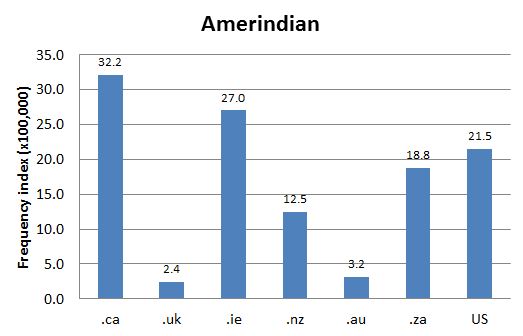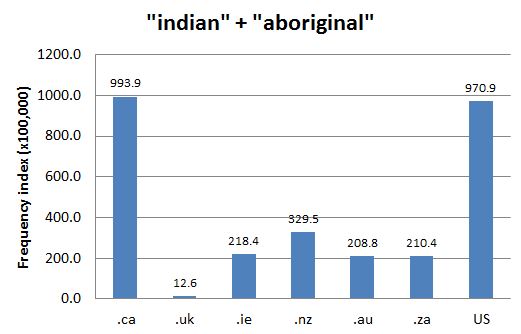DCHP-2
Amerindian DCHP-2 (November 2016)
Non-Canadianism
1 adj. — Ethnicities, slightly derogatory
of or relating to the Indians of the Americas.
The term Amerindian is a contraction of American and Indian that has been occasionally used as an umbrella term for all indigenous populations who inhabit North, Central and South America. It is particularly frequent in anthropological contexts (see AHD-5, s.v. "Amerindian"). It is dated, has acquired negative undertones and should be avoided. Moreover, it is noted that Amerindian is more frequently used when discussing the "native peoples of the Caribbean and Central and South America" (see AHD-5, s.v. "Amerindian"). COD-2, s.v. "Amerindian", marks this term as "much less common in Canadian English [in contrast to the term] Indian", which is supported by a comparison of frequency index points seen in Charts 1 and 2, as the total frequency points for Amerindian in the Canadian domain is 32.2, versus 939.9 for "Indian".See also: Amerind Aboriginal
- This term should be avoided in Canadian English, as it carries negative undertones today. Instead, use of the term aboriginal is recommended. Note the racist undertones of the 1922 quotation.
2 n. — Ethnicities, derogatory
an Indian of the Americas.
See also: Amerind Aboriginal (See usage note with meaning 2)
- This term should be avoided in Canadian English, as it carries negative undertones. Instead, use of the term aboriginal is recommended.
Images:
Chart 1: Internet Domain Search, 5 May 2014
Chart 2: Internet Domain Search, 7 May 2014

